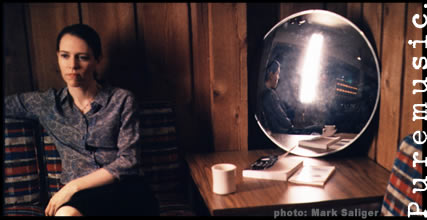
The Ghostly
Ones (continued)
Parked along the side of the highway here and there on the way to Carrboro were white school buses with "Inmate Transfer Bus" written in black letters beneath the windows, and around the buses were convicts in prison clothes picking up trash. "In the meantime, you're in another band," Rawlings said to Welch.
"Campy seventies covers, which is very funny to do, in my opinion," Welch said. "Late Elvis, Neil Diamond."
"The band's name is Sofa."
"And everyone in it has a persona," Welch said. "I was Oprah von Sofa. Hal, the drummer, worked at a Goodwill sorting station, so he had access to all this wild, psychedelic clothing that people were finally getting rid of. Plaid pants and vinyl belts. I wore my hair in pigtails. It spilled over into my real life. If you've got such great clothes, you don't just want to wear them onstage, and likewise the names. A lot of people just knew me as Oprah. It was very helpful to me to have a costume and an alter ego. In Sofa, I'm sometimes on bass and sometimes on guitar. The bluegrass band moved out of the house, and Sofa moved in. This is the band I actually start doing gigs with. We make a demo, we have posters, we're a slightly working band."
"Then the next thing, Gill's done with that life, and she's going to live in Wales," Rawlings said.
"The earthquake hit in '89," Welch said. "I was up on campus when it happened, and as I made my way home things got stranger and stranger. People were trapped in their houses, because the roofs had collapsed, chimneys had fallen, cars were smashed under trees, and water mains had broken. They stood on their lawns with their radios on, so you could hear more than one as you passed. By the time I reached home, I was completely shaken up. My bedroom wall was like a spiderweb. In the days after, people couldn't sleep. My best friend, who lived in San Francisco, said, 'You should get out.' We arranged to house-sit for a woman in Wales. We were maybe going to travel around and take pictures."
"But it's a little quiet," Rawlings said.
"We were very out of place," Welch said. "After a couple of months, we got a little bored, then we realized that we had the use of this woman's car. This whole thing ends up in Amsterdam."
"And then there's a conference with her parents, who have long sensed that things are going to need attention," Rawlings said.
"They ask me what do I want to do, and I say, 'I want to do music.'"
"And they say, 'If you're going to play music you're going to have to go to school for it.'"
"Which is funny, because they didn't."
In 1990, a friend of Welch's parents wrote a recommendation for her to the Berklee College of Music, in Boston.
"Her parents make the situation happen. But on the other hand it's in Boston, so they don't have that much control," Rawlings said.
"Just come back to the story," Welch said.
"All right. So Gill goes to Boston, and of course she's useless at Berklee."
"It's a jazz school."
"And she's a primitive."
"I felt like a Martian," she said. "I'm out of my peer group. I have no friends. I'm in my room listening to brother-team music."
"One of her teachers looks at the way she makes a C chord and says, 'If you keep doing that you'll be a cripple in a few years.' But she stays for two years and majors in songwriting, and the songwriting program is just starting to flower."
Welch and Rawlings began going out with each other at Berklee. They met in a hallway, while waiting to audition for the country-band class. At Berklee, Welch overcame her shyness about performing, she said, "because you had to. In every class, you had to do things in front of about twenty people." continue
print (pdf) listen to clips puremusic home